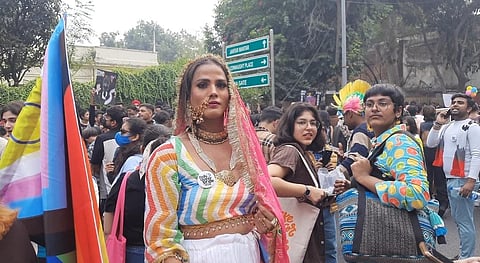
New Delhi- In a recent ANI interview, Women and Child Minister Smriti Irani reacted to Manoj Jha’s question on including the LGBTQIA+ community in menstrual policy. While her comment is nothing but ignorant, this raises a deeper issue of invalidating queer experiences in medical policies.
The Mooknayak spoke to Aranya Vadera, a trans-nonbinary scholar pursuing Women’s Studies. Talking about the trans experience regarding menstruation, they said, “As someone who was assigned female at birth, I had my experience with periods even though they stopped with hormonal transition. Periods are not a cis-woman problem and can be alienating towards trans men who might have not undergone treatment. While undergoing medical treatment, trans people might go through a humiliating experience. When I was in school and used to look as a stereotypical male and used to go to the nurse for a pad, I used to be asked unnecessary and intrusive questions.”
They continued, “Smriti Irani’s comments are invalidating trans experiences. Her statements make one feel the entire queer community only consists of cis gay men, which is not true.”
During a discussion on menstrual leave in parliament last week, Manoj Jha asked, "Can the Minister of Women and Child Development tell us if the government is going to introduce a policy on menstrual hygiene soon? And does this policy include measures to support menstrual hygiene in the LGBTQIA+ community?"
The Union Minister for Women and Child Development, Smriti Irani, recently shared that she disagrees with the idea of giving paid leave to women during their menstrual periods. She made this statement while talking with Rashtriya Janata Dal (RJD) MP Manoj Kumar Jha in the Rajya Sabha.
Jha had asked if the proposed menstrual hygiene policy would include measures to support menstrual hygiene in the LGBTQIA+ community. Irani responded by asking, "Which gay man, without a uterus, has a menstrual cycle?" Later, in an interview with the news agency ANI, Irani explained her response. She said, "I spoke from my personal experience because I don't want more and more women to be harassed." She mentioned that she could have said more, but she felt the person asking the question wasn't looking for solutions for women.
Talking about the need for comprehensive medical policies, Aranya said, “Menstrual policies need to be more inclusive. One needs to look at the language to make sure the wordings are not alienating towards other marginalized sections. Accessibility to healthcare and hygiene will greatly benefit any community. Experiences of trans and non-binary cannot be invalidated.”
Not all women menstruate, and not all people who menstruate identify as women. Some women who were assigned female at birth may not have their monthly periods for different reasons. This can happen because of menopause, which is a natural part of aging. High stress, certain illnesses, or having surgery to remove the uterus (hysterectomy) can also stop periods. In some cases, women may never start having periods because of various health conditions affecting their hormones or reproductive system. So, the absence of monthly periods can be caused by many things beyond just getting older.
Vadera said, “I also feel that since periods are seen as a ‘women’s issue,’ it can add to gender dysphoria of individuals. Upon that, such a drive should focus on de-gendering any bodily function. Body processes cannot inherently carry the tag of a gender. A trans man with a uterus cannot be invalidated because of the thought process of society.”
According to the research titled ‘Outcomes of Menstrual Management Use in Transgender and Gender-Diverse Adolescents’ published by the National Library of Medicine in March 2023, menstruation is not just a sign of fertility but a discouragement to trans and non-binary folks as well. The publication states that the start of menstruation can worsen feelings of discomfort for those who don't identify as female, especially for transgender and gender-diverse adolescents. Many of them wish to find ways to manage menstruation to reduce this discomfort.
Since more gender-diverse young people are seeking medical care, and at the same time, some places are criticizing gender-affirming care, it's important to explore different options to improve outcomes for this group. One possible way is through menstrual management, which could help ease discomfort for transgender youth. This study aims to describe and compare the results of different menstrual management methods used by transgender and gender-diverse adolescents in their first year.
Also Read-
You can also join our WhatsApp group to get premium and selected news of The Mooknayak on WhatsApp. Click here to join the WhatsApp group.